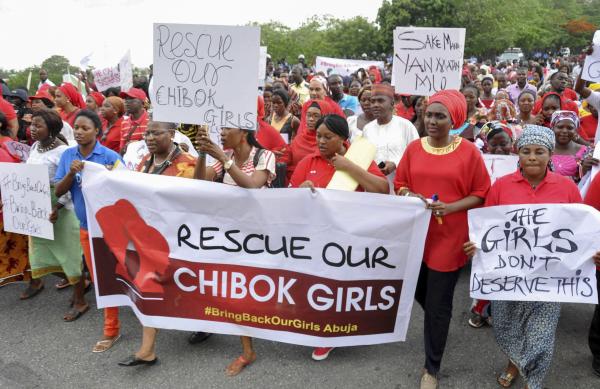If there is a glaring reality the movement has brought to the fore, it is the ineptitude of the Nigerian government in protecting its citizens. The abduction of the Chibok school girls captivated the world’s attention and thrust Nigeria into the frenzied world of 24hours global news media for the wrong reasons. An international outcry for their release under the social media hash tag #BringBackOurGirls ensued.
However, seven months after they were abducted and with the New Year around the corner, they are yet to come home. It is in their absence that the leadership of the #Bring BackOurGirls movement have vowed to ensure no one forgets their plight. The Bring Back Our Girls (BBOG) advocacy group has one singular purpose, which shapes the core of its mission – “To bring back our girls now and alive.” It is their call to the Nigerian government, and global community, demanding action on behalf of the Chibok girls kidnapped in April his year. Since their abduction in April, BBOG has spearheaded a campaign to ensure their predicament does not disappear from Nigeria’s national discourse or the international agenda. Obiageli Ezekwesili, Saudatu Mahdi, Maryam Uwais and Hadiza Bala Usman are co-conveners of BBOG.
In the absence of the Nigerian government speaking out in the early days of the girls’ abduction, a vacuum was created, which BBOG filled. All four women agree, they responded to a need that could not be ignored, despite it being fraught with difficulties. Boko Haram (which translates as “western education is forbidden”) has been in existence since 2002. The group’s original name is Jama’atu Ahlis Sunna Lidda’awati wal-Jihad and means “People Committed to the Propagation of the Prophet’s Teachings and Jihad.” At Boko Haram’s onset, the aim was to ban western education.
However, in 2009, (The same year their founding leader Mohamed Yusuf was killed in police custody) they took up arms and started waging an insurgent war against the Nigerian government. Over time, their vision has broadened to include overthrowing the government and creating an Islamic state. In April, Boko Haram gained global notoriety for the kidnapping of 276 Chibok girls. Prior to the girls’ abduction, their indiscriminate killings led to the death of over 25 teenage boys at Federal Government College, Buni Yadi.
In early November, a suicide bomber dressed as a student detonated a bomb that killed over 40 students during morning assembly at Government Science Secondary School, Potiskum, Yobe State. While the group is yet to claim responsibility for the attack, security forces have already pointed the finger at them as the attack bears the hallmarks of Boko Haram.
Attacks by Boko Haram have killed hundreds and displaced thousands, but why is the predicament of the Chibok girls, the one incident that has held the world’s attention and the platform on which the BBOG group has come together to cry out for peace, security and stability in the country? It is a question Ezekwesili admits has been posed to her. “People sometimes say ‘why this one?’ How about all the other things that have happened?. One reason is because when the Buny Yadi boys were slaughtered and roasted, everybody moved on. A few women came out and marched for one day, but nobody bothered much. I normally say to them, it takes a particular thing to be a turning,” she said. If there is a glaring reality the BBOG movement has brought to the fore, it is the ineptitude of the Nigerian government to defeat Boko Haram and protect its citizens.
BBOG’s impact cannot be underestimated, from its concerted efforts to keep the story of the Chibok girls story alive in the media to being a pillar of support for their families. When the girl’s abduction was headline news in April, notable voices like Michelle Obama lent their voice and support to their cause. It was the cover story in international newspapers on both sides of the Atlantic, a trending topic on social media, but at a time of heightened geo-political uncertainty due to conflicts in Syria and Ukraine, ISIL in Iraq, the Ebola epidemic in West Africa and the continuous heinous reign of Boko Haram, the story of the Chibok girls is no longer as high on the agenda.
Nevertheless, BBOG says it do whatever it can to keep the girls in people’s hearts. Ezekwesili explains that the group also works with organisations like UN Women by striking a strategic relationship with them.
While one cannot quantify the trauma the girls have endured since April, it is worth noting that the families they left behind are equally in anguish. According to the families of the girls, the BBOG movement has been “succor and sure foundation of hope” says Ezekwesili. She confirms that members of the girls families are in a bad situation with health challenges that includes heart conditions and high blood pressure and “over seven of the parents of the girls have passed away. The families are not in a good place to the extent where they have been considering having funeral rites for their daughters. Within their culture, if a person is missing, after that four months, the family members come together to do funeral rites, assuming that the person is dead. It’s been over 6 months.”
The women have developed a relationship based on trust with the Chibok community says Uwais. “They trust that we will continue to demand for the swift rescue of our girls, and are ready to share even the most sensitive of information with us, knowing our motives are aligned with theirs.”
BBOG’s advocacy work has thrust them into a position of visibility that has come at a cost to the group (including personal) and put them at odds with the Nigerian government. Though the group maintains it is not a political platform, this has not helped with the backlash that has ensued. Ezekwesili, who by default has seen herself become the leading voice of the group said: “By making such strident demands for the girls rescue, we inadvertently exposed our government’s weaknesses in the rescue effort. Our consistent demands have become a sore point and the government has regrettably become almost hostile to the movement.” It has also had an effect on their personal lives. “Personally, my daily routine (and law practice) has suffered. My husband is uneasy, worried about us being in the line of danger,” says Uwais. However, the women are clear that they were aware speaking out have would come at a price.
In October, the Nigerian government announced to the world that a ceasefire deal had been agreed with Boko Haram and the girls release imminent. At the time, the BBOG co-conveners said they were extremely anxious and cautiously optimistic. Their caution was justified, a few weeks later Boko Haram leader Umaru Shekau appeared in a video and boldly told the world girls had been converted to Islam and married off, and there was no deal with the Nigerian government. It was another humiliating episode for the government of President Goodluck Jonathan in a long line of missteps in its dealings with Boko Haram.
Though the video of Shekau informing the world about the girls being married off was a shock, BBOG remained unmoved. It remains to be seen what the lasting impact the BBOG movement will have on advocacy in Nigeria, especially as it relates to women and girls. In the meantime, no one can deny that their efforts is the reason Nigerians and the global community still remember there are 219 girls in captivity and have been for over 200 days.




